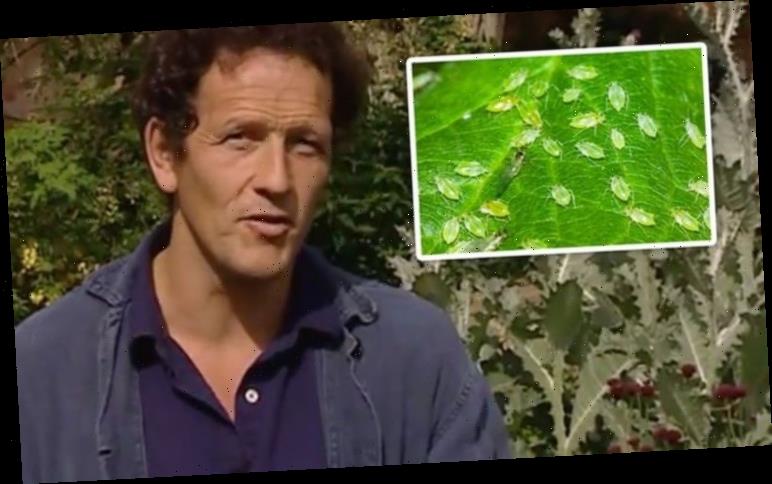Monty Don gives advice on dealing with aphids
In a video for BBC Gardeners’ World, Monty explained how control aphids and other garden pests. Monty warned fellow gardeners that aphids can spread viruses from plant to plant which means it’s even more important to watch how you grow your plants. Monty recommended organic methods of dealing with aphids, one of which involves boiling down leaves.
The BBC Gardeners’ World regular showed viewers some brown aphids on one of his plants.
“There are over 200 different types. They tend to be plant specific,” he said.
He continued: “Some are green which are normally on roses, black ones which we have here on the cardoons and you see on broad beans.
“They do tend to spread virus from plant to plant.
“So it’s very important to grow plants hard. Harden them off well before planting them out, give them lots of cold weather, don’t overfeed them because all you’ll do is encourage lush growth and the aphids love that – that’s what they’re after.”
We will use your email address only for sending you newsletters. Please see our Privacy Notice for details of your data protection rights.
Monty said there will “come a time” when you will want to intervene and get rid of aphids on your plants rather than let nature take its course.
The gardening expert said there are things you can do about them without resorting to chemicals.
Chemicals could damage the ecosystem of your whole garden.
Monty explained what steps you should take when dealing with aphids.
He said: “The first thing you can do is simply spray them with water.
DON’T MISS
Gardening: Slow growth could mean your houseplant needs repotting [INSIGHT]
Monty Don issues warning over household waste on Gardeners’ World [UPDATE]
Monty Don shares how to keep flowers blooming during ‘cruellest month’ [ANALYSIS]
“That is remarkably effective but only really useful on big plants.”
With smaller plants, if you use a hose pipe, you could risk knocking them over or snapping their stems.
Instead, Monty said you can use certain organic sprays.
Some of them have certain acids in them which are also known as “soft soap”.
“It coats the insects, it stops them breathing and also in the case of aphids, it causes them to explode.
“But it will kill beneficial insects. So all these sprays you want to use at night or at dawn when there aren’t bees around.
“But the good thing about them [sprays] is they’re not residual.
“They work on contact and they won’t damage anything that comes around after it’s dried out.”
Monty also recommended another organic spray which is derived from rape seed.
The gardening expert explained that the positive aspect of this one is if you spray it on vegetables, you can still eat them an hour or two later.
Monty also recommended using seaweed on aphids which also encourages the health of the plant.
“It’s mainly used for encouraging the health of the plant which enables it to resist aphid attack or any viruses that it brings.
“But it will also work as a very mild insecticide.”
Monty’s last recommendation was rhubarb leaves which can be boiled up, mixed with water and used as a spray.
“It’s a cheap way of doing the job,” Monty added.
Source: Read Full Article



